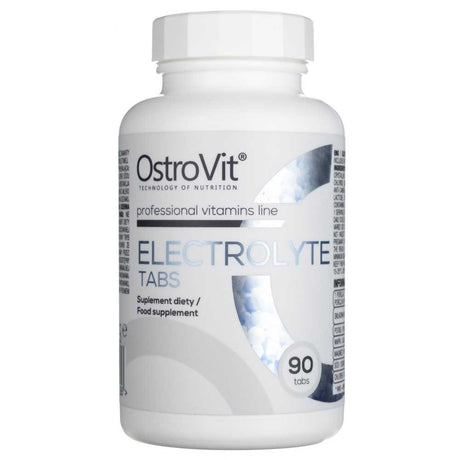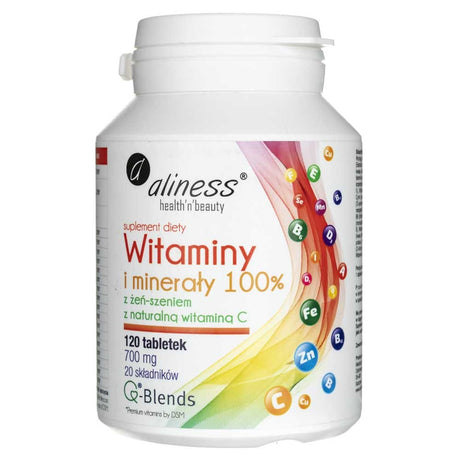Solgar
Solgar Gentle Iron 20 mg - 90 vegetabiliska kapslar
Ordinarie pris 172.09 krPris per enhet1.91 kr /itemEj tillgängligVitaler's
Vitaler's Krom 200 mcg - 180 tabletter
Ordinarie pris 42.39 krPris per enhet0.24 kr /itemEj tillgängligAliness
Aliness Ekologiskt kisel från bambuskott 500 mg - 100 vegokapslar
Ordinarie pris 124.99 krPris per enhet1.25 kr /itemEj tillgängligSolgar
Solgar Glukosamin Hyaluronsyra Chondroitin MSM - 120 tabletter
Ordinarie pris 596.59 krPris per enhet4.97 kr /itemEj tillgängligInvex Remedies
Invex Remedies Silor B Kisel med bor, vätska - 1000 ml
Ordinarie pris 424.49 krPris per enhet424.49 kr /lEj tillgängligOstrovit
Ostrovit Chromium 200 - 200 tabletter
Försäljningspris 46.42 kr Ordinarie pris 51.59 krPris per enhet0.23 kr /itemEj tillgängligSwanson
Swanson SelenoExcell Selen 200 mcg - 60 kapslar
Ordinarie pris 48.09 krPris per enhet0.80 kr /itemEj tillgängligOstrovit
Ostrovit Elektrolyt - 90 tabletter
Försäljningspris 68.02 kr Ordinarie pris 75.59 krPris per enhet0.76 kr /itemEj tillgängligSolgar
Solgar Hud, Naglar och hår - 60 tabletter
Ordinarie pris 161.79 krPris per enhet2.70 kr /itemEj tillgängligSwanson
Swanson Kelp Jodkälla 225 mcg - 250 tabletter
Ordinarie pris 87.19 krPris per enhet0.35 kr /itemEj tillgängligAliness
Aliness Järn MicroFerr 25 mg - 100 tabletter
Ordinarie pris 105.49 krPris per enhet1.05 kr /itemEj tillgängligAliness
Aliness Chelaterat zinkdiglycinat 15 mg - 100 tabletter
Ordinarie pris 83.69 krPris per enhet0.84 kr /itemEj tillgängligNow Foods
Now Foods Järn 18 mg - 120 vegokapslar
Ordinarie pris 114.69 krPris per enhet0.96 kr /itemEj tillgängligDoctor's Best
Doctor's Best Magnesium med hög absorptionsförmåga 100 mg - 120 tabletter
Ordinarie pris 178.99 krPris per enhet1.49 kr /itemEj tillgängligOstrovit
Ostrovit Kalium - 90 tabletter
Försäljningspris 42.28 kr Ordinarie pris 46.99 krPris per enhet0.47 kr /itemEj tillgängligNow Foods
Now Foods Magnesiumcitrat 400 mg - 240 vegokapslar
Ordinarie pris 332.69 krPris per enhet1.39 kr /itemEj tillgängligNow Foods
Now Foods Järnkomplex - 100 tabletter
Ordinarie pris 115.79 krPris per enhet1.16 kr /itemEj tillgängligAliness
Aliness Vitaminer och mineraler 100% - 120 tabletter
Ordinarie pris 95.19 krPris per enhet0.79 kr /itemEj tillgängligNow Foods
Now Foods L-OptiZinc 30 mg - 100 vegokapslar
Ordinarie pris 88.29 krPris per enhet0.88 kr /itemEj tillgängligNow Foods
Now Foods Magnesiumcitrat - 180 softgels
Ordinarie pris 258.09 krPris per enhet1.43 kr /itemEj tillgängligSwanson
Swanson Glukosamin, Kondroitin & MSM - 120 tabletter
Ordinarie pris 161.79 krPris per enhet1.35 kr /itemEj tillgängligAliness
Aliness Kaliumcitrat 300 mg - 100 tabletter
Ordinarie pris 75.59 krPris per enhet0.76 kr /itemEj tillgängligNow Foods
Now Foods Selen 100 mcg - 100 tabletter
Ordinarie pris 60.79 krPris per enhet0.61 kr /itemEj tillgängligSwanson
Swanson Kaliumcitrat 99 mg - 120 kapslar
Ordinarie pris 61.89 krPris per enhet0.52 kr /itemEj tillgänglig
Förstå betydelsen av mineraler för din hälsa
Mineraler är viktiga komponenter som spelar en avgörande roll för att upprätthålla optimal kroppsfunktion. Dessa viktiga element bidrar till att bygga starka ben, upprätthålla syra-basbalansen, och bilda röda blodkroppar. Även om en balanserad kost kan ge många nödvändiga mineraler, kan tillskott vara fördelaktigt när kostintaget inte räcker till. Låt oss fördjupa oss i mineralernas värld, deras typer, och deras betydelse för en frisk kropp.
Mineralernas viktiga roll i kroppens funktion
För långsiktig hälsa, måste alla mineraler vara i balans i kroppen. Mineralbrister kan leda till allvarliga hälsoproblem som anemi, sköldkörtelproblem, och tandemaljförlust. Dessa vitala element reglerar hjärtslag, stärker ben och tänder, och hjälper till att upprätthålla hälsosamma blodtrycksnivåer. Att säkerställa ett tillräckligt mineralintag är nyckeln till att stödja det allmänna välbefinnandet och förebygga olika hälsoproblem.
Förstå olika typer av mineraler
Mineraler kategoriseras i två huvudgrupper: mikronäringsämnen och makronäringsämnen. Denna klassificering baseras på det dagliga behovet av varje mineraltyp.
Mikronäringsämnen: Små mängder, stor inverkan
Mikronäringsämnen är mineraler som behövs i små mängder, vanligtvis mindre än 100 mg per dag. Trots de små mängderna, är dessa mineraler avgörande för att kroppen ska fungera korrekt. Några viktiga mikronäringsämnen inkluderar:
- Zink : Viktigt för immunförsvaret, sårläkning, och hudens hälsa
- Koppar: Viktigt för hjärthälsa och syretransport
- Järn: Viktigt för bildning av röda blodkroppar och syrgascirkulation
Makronäringsämnen: Grunden för mineralhälsan
Makronäringsämnen behövs i större mängder, än 100 mg per dag. Dessa mineraler utgör grunden för många kroppsliga processer och är en integrerad del av cellstrukturen. Viktiga makronäringsämnen inkluderar:
- Kalcium : Avgörande för benhälsa och muskelfunktion
- Magnesium: Viktigt för energiproduktion och nervfunktion
- Kalium: Viktigt för hjärthälsa och vätskebalans
Viktiga mineraler för optimal hälsa
Alla mineraler är viktiga, men vissa kan vara svårare att få i sig enbart genom kosten. Här är några viktiga mineraler som förtjänar särskild uppmärksamhet:
Chromium: Blodsockerbalanseraren
Chromium är ett spårämne som spelar en avgörande roll i glukosmetabolismen. Det hjälper till att kontrollera blodsockernivåerna, vilket potentiellt kan minska risken för diabetes. Dessutom kan, krom bidra till att sänka det onda kolesterolet samtidigt som det höjer det goda kolesterolet, och skyddar mot åderförkalkning.
Zink: Immunförsvaret och huden
Zink är viktigt för att bibehålla en frisk hud, hår, och naglar. Det spelar också en viktig roll för sårläkning och immunförsvaret. Zinkbrist kan leda till förlängda läkningstider och hudproblem. Detta mineral bidrar också till benstyrkan, vilket gör det fördelaktigt vid tillstånd som reumatism.
Koppar: Hjälper cirkulationssystemet
Koppar är avgörande för att upprätthålla ett hälsosamt cirkulationssystem och en god hjärtfunktion. Den hjälper till med syretransporten till cellerna och påverkar neurotransmittoraktiviteten, vilket kan förbättra hjärnans funktion. Genom att säkerställa ett tillräckligt kopparintag kan man stödja den övergripande kardiovaskulära och neurologiska hälsan.
Slutsats: Omfamna mineralhälsan
Att förstå mineralernas roll i kroppen är avgörande för att upprätthålla optimal hälsa. En balanserad kost är den bästa källan till mineraler, men, kosttillskott kan hjälpa till att åtgärda brister och stödja det allmänna välbefinnandet. På Medpak, erbjuder vi ett brett utbud av högkvalitativa mineraltillskott som hjälper dig att tillgodose dina näringsbehov. Utforska vår kollektion och ta ett steg mot bättre hälsa Toda y.





















